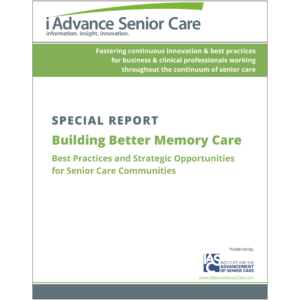More volunteer power: The Dorotha C. White Foundation
Across America, we adopt orphans from other countries, domestic-born babies, and foster children. We adopt highways. We adopt laws. These efforts exercise the heart of a free society and give all human beings a chance at life, liberty, and the pursuit of happiness. Where this philosophy seems to end is at the threshold of our nursing homes.
The Dorotha C. White Foundation will take a leadership role in restoring “elderpride” by working with legislative leaders, with the media, and at the grassroots level, organizing a social and political movement for change to improve the treatment of our senior citizens, provide them with restorative care, and end elder abuse in our country.
Sharon Rhoads, president and cofounder of the Dorotha C. White Foundation, and Jerry Rhoads, chairman and cofounder, are in the business of helping nursing homes improve their programming and provide the companionship, emotional support, socialization, and spiritual services that are so direly needed. Sharon Rhoads’s mother, Dorotha C. White, for whom the Foundation was named, died of abuse and neglect in a nursing home. It was not of her choosing to be placed there. However, because of circumstances similar to most families’, there was no other alternative.The Foundation’s “Adopt a Nursing Home Patient” program is dedicated to promoting productive lives in nursing homes by avoiding the type of occurrences that befell Dorotha. This program, which applies to both skilled nursing facilities (SNFs) and assisted living facilities, will benefit patients who:
may not have friends and family nearby who can make frequent visits;
are looking for companionship; and/or
may be depressed and lonely.
We do not advocate dumping patients back into a community that is not capable or ready to take on such a huge responsibility. Our philosophy is that nursing homes are not homes for the elderly. They are called such and society accepts this as the only alternative. We propose alternatives that embrace the body, mind, heart, and spirit in order to:
Recognize that skilled nursing care is not home care—it is transitional care.
Replace the medical model practiced by physicians, hospitals, and nursing homes with the Restorative Model.
Encourage community involvement in making the transition.
Mandate a reimbursement system rewarding outcomes that improve and restore function.
Set up community-based programs that assist in the restoration of the elderly back into community-based services.
“Adopt a Nursing Home Patient” shows the kind of involvement that is needed. Missing in most nursing homes is the companionship factor, the emotional uplift factor, the socializing factor, and the spiritual factor. Why? Because the staff is not organized to deliver holistic care. We have performed studies revealing that nursing homes do not provide psychosocial programming because they are not being paid for it. This is an alarming fact. Solving this crisis will take the effort of the community, politicians, clinicians, providers, and families. Under our “Adopt a Nursing Home Patient” program, we are dealing with four factors:
Companionship. A visit by a real person, who is compassionate and interested in the patient’s feelings, needs, problems, and hopes, will create healing that is not medicinal.
Emotions. Writing a letter to a patient who does not receive mail enhances the patient’s self-worth and lifts the spirit in knowing that someone cares.
Socialization. Currently, patients are grouped around TVs and sitting in wheelchairs with no social stimulation. Volunteers can give patients an emotional uplift by taking them out for a walk around the facility grounds, playing a game, or joining them in a sing-along or musical performance.
Spiritual stimulation. Church can be brought to the patient or the patient can be taken to church. It takes someone to do it.
Studies have shown that visitation in nursing homes is at an all-time low because of odors, depressive surroundings, the perspective that the aging process is discouraging, low esteem of the workers, insensitive providers, and state and federal enforcement tactics. We believe that the “Adopt a Nursing Home Patient” program can bring positive forces to bear: volunteerism, benevolence, free services for cleaning and maintaining the facility, and community services brought to the patient rather than vice versa. Many families need this assistance because of time constraints and family obligations.
The Foundation will provide free advertising on its Web site (see below) for those providers who implement the “Adopt a Nursing Home Patient” volunteer program. The facility must assist in screening the volunteers and measuring the effectiveness of the program.
Be a part of the Foundation’s efforts to promote productive lives in nursing homes.
Sharon Rhoads is President and Cofounder and Jerry Rhoads is Chairman and Cofounder of the Dorotha C. White Foundation.
For more information on the program and ways to get involved in helping the elderly, please phone Sharon Rhoads at (800) 789-4836, e-mail srhoads@dcwhitefoundation.org, or visit https://www.dcwhitefoundation.org. To send your comments to the authors and editors, e-mail rhoads0907@nursinghomesmagazine.com.
Sidebar
Frequently Asked Questions
Is the volunteer able to choose the facility?
Yes, if the volunteer knows of a facility he or she would like to visit, that is acceptable. The Foundation will contact the facility and make the connection.
How frequently should the volunteer visit the patient?
The main purpose of the program is to provide companionship, emotional involvement, socialization, and spiritual contact for those in need. While we recommend an open-ended, long-term pledge to the program, there are no rules or stipulations on how frequently the volunteer should be visiting the patient. That is up to the volunteer.
Is it permissible for the volunteer to take the patient out of the facility for a function or outing?
Taking the patient on an outing outside the facility is possible, although not expected. Many people who are generous enough to donate their personal time to this effort may not have the freedom or the time to transport the patient. However, if the circumstances are feasible for both the patient and the volunteer, this option is available.
What is the expected length of the volunteer assignment?
We prefer an ongoing commitment to the program; however, we realize issues may arise that might limit a volunteer’s involvement. Should this occur, please contact the Foundation immediately.
What if the patient becomes upset or concerned about a personal matter or a facility issue during the visit with the volunteer?
If the patient becomes upset or concerned, the volunteer should inform the director of nursing or assistant director of nursing on duty.
What if the relationship between the patient and volunteer is not working out?
We suggest that if the arrangement between the patient and volunteer is not comfortable or is not working out, the volunteer should contact the Foundation immediately.
Can a volunteer adopt more than one patient?
Yes, a volunteer may adopt more than one patient if he or she wishes.
I Advance Senior Care is the industry-leading source for practical, in-depth, business-building, and resident care information for owners, executives, administrators, and directors of nursing at assisted living communities, skilled nursing facilities, post-acute facilities, and continuing care retirement communities. The I Advance Senior Care editorial team and industry experts provide market analysis, strategic direction, policy commentary, clinical best-practices, business management, and technology breakthroughs.
I Advance Senior Care is part of the Institute for the Advancement of Senior Care and published by Plain-English Health Care.
Related Articles
Topics: Activities , Articles , Staffing











